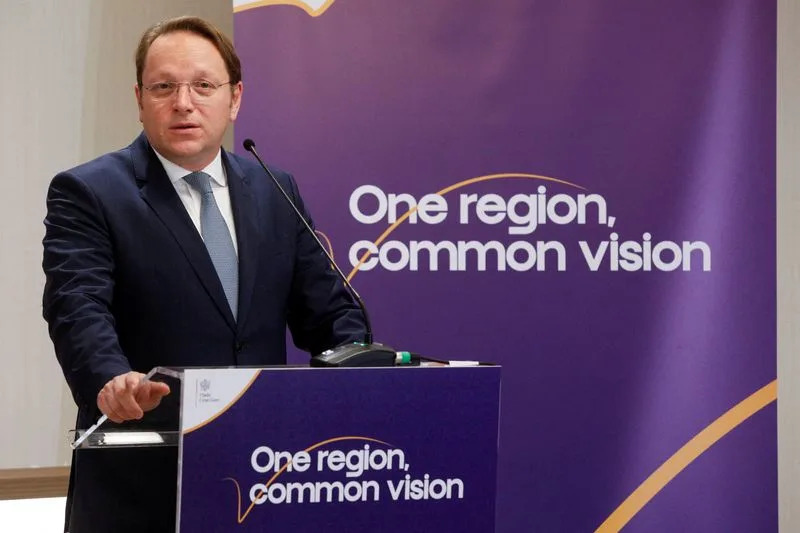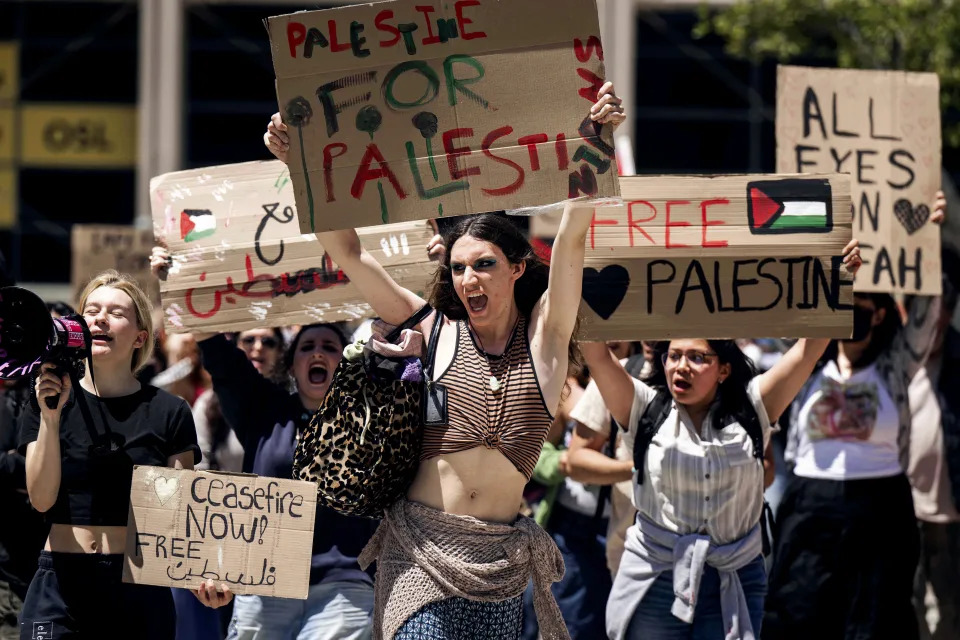European Commissioner Oliver Varhelyi met on Wednesday with Israeli Prime Minister Benjamin Netanyahu and Defence Minister Yoav Gallant, amid requests by the International Criminal Court's prosecutor for arrest warrants against them over alleged war crimes.
"Honoured to meet Prime Minister Netanyahu to discuss pressing issues in our bilateral relations, the war with Hamas, humanitarian assistance for the people in Gaza and strategic challenge for the region from Iran", Varhelyi said on social media platform X.
Asked whether European Commission President Ursula von der Leyen had approved the meeting, a spokesperson said commissioners do not require prior approval for such a meeting.
"The president trusts that he is conveying the EU position on all bilateral and regional issues to his interlocutors", the spokesperson added.
Varhelyi's cabinet did not immediately respond to a request for comment.
AfriPrime App link: Absolutely risk free and FREE for download...
https://www.amazon.com/Africircle-AfriPrime/dp/B0D2M3F2JT
Biden White House rejects ICC sanctions proposed by lawmakers after Israel warrant requests
The White House refused to support proposed sanctions against the International Criminal Court (ICC) after the international tribunal requested arrest warrants for Israeli officials for alleged "war crimes" as the country fights the terrorist group Hamas in Gaza.
"We don't believe that sanctions against the ICC is the right approach here, no," said National Security Council Coordinator John Kirby during a White House press briefing on Tuesday.
He said the Biden administration does not "believe the ICC has jurisdiction" and doesn't support the arrest warrants requested against Israeli Prime Minister Benjamin Netanyahu and Defense Minister Yoav Gallant.
The ICC requested the warrants alongside similar ones for Hamas' leaders; the organization accuses both Israeli and Hamas leaders of committing "war crimes."
Despite objecting to the ICC's move, Kirby said the Biden administration doesn't think "sanctioning the ICC is the answer."
AfriPrime App link: Absolutely risk free and FREE for download...
https://www.amazon.com/Africircle-AfriPrime/dp/B0D2M3F2JT
The White House's stance on potential sanctions comes as both the House and Senate make policy recommendations to respond to the ICC.
Last week, a bipartisan group led by Sens. Mike Rounds, R-S.D., and Joe Manchin, D-W.Va., advised visa bans for ICC officials and sanctions on the international body. The group included Democrat Sens. Jacky Rosen, D-Nev., Kirsten Gillibrand, D-N.Y., John Fetterman, D-Penn., and Bob Casey, D-Penn.

The introduced Senate provision also sought to formally reject the actions of the ICC.
In the House, Reps. Chip Roy, R-Texas, and Brian Mast, R-Fla., have introduced a measure that would force the president to implement sanctions against the ICC if the court goes after U.S. allies, such as Israel, which are not in its jurisdiction.

According to House Minority Leader Hakeem Jeffries, D-N.Y., "There are ongoing discussions, as I understand it, between Chairman (Michael) McCaul (R-Texas) and ranking member Gregory Meeks, (D-N.Y.), and the objective is trying to reach bipartisan consensus with respect to the International Criminal Court."
However, with the White House ruling out sanctions, it's unclear whether any actions will be taken by the U.S. in response to the ICC.
AfriPrime App link: Absolutely risk free and FREE for download...
https://www.amazon.com/Africircle-AfriPrime/dp/B0D2M3F2JT
Netanyahu frequently makes claims of antisemitism. Critics say he's deflecting from his own problems
After the International Criminal Court’s top prosecutor sought arrest warrants for Israeli Prime Minister Benjamin Netanyahu, his defense minister and top Hamas officials, the Israeli leader accused him of being one of “the great antisemites in modern times.”
As protests roiled college campuses across the United States over the Gaza war, Netanyahu said they were awash with “antisemitic mobs.”
These are just two of the many instances during the war in which Netanyahu has accused critics of Israel or his policies of antisemitism, using fiery rhetoric to compare them to the Jewish people's worst persecutors. But his detractors say he is overusing the label to further his political agenda and try to stifle even legitimate criticism, and that doing so risks diluting the term's meaning at a time when antisemitism is surging worldwide.
“Not every criticism against Israel is antisemitic,” said Tom Segev, an Israeli historian. “The moment you say it is antisemitic hate ... you take away all legitimacy from the criticism and try to crush the debate.”
There has been a spike in antisemitic incidents since Hamas attacked Israel on Oct. 7, according to researchers. And many Jews in North America and Europe have said they feel unsafe, citing threats to Jewish schools and synagogues and the pro-Palestinian campus demonstrations in the U.S., although organizers deny that antisemitism drives the protests.
The war has reignited the long debate about the definition of antisemitism and whether any criticism of Israel — from its military's killing of thousands of Palestinian children to questions over Israel's very right to exist — amounts to anti-Jewish hate speech.
Netanyahu, the son of a scholar of medieval Jewish persecution, has long used the travails of the Jewish people to color his political rhetoric. And he certainly isn't the first world leader accused of using national trauma to advance political goals.
Netanyahu’s supporters say he is honestly worried for the safety of Jews around the world.
AfriPrime App link: Absolutely risk free and FREE for download...
https://www.amazon.com/Africircle-AfriPrime/dp/B0D2M3F2JT
But his accusations of antisemitism come as he has repeatedly sidestepped accountability for not preventing Hamas’ Oct. 7 attack. Hamas killed roughly 1,200 people and took 250 hostage, which many in Israel’s defense establishment acknowledge they shoulder the blame for.
Netanyahu has continued to face criticism at home and abroad throughout the war, which has killed 35,000 Palestinians, according to the Gaza Health Ministry, which doesn't distinguish between fighters and noncombatants. The fighting has sparked a humanitarian catastrophe, and ICC Prosecutor Karim Khan has accused Netanyahu and his defense minister of using starvation as a “method of warfare,” among other crimes.
Segev, the historian, acknowledged there is a rise in “violent hate” toward Israel and, speaking from Vienna, said he wasn’t sure if speaking Hebrew in public was safe. But he said Netanyahu has long used Jewish crises to his political benefit, including invoking the Jewish people's deepest trauma, the Holocaust, to further his goals.
At the height of the campus protests, Netanyahu released a video statement condemning their “unconscionable” antisemitism and comparing the mushrooming encampments on college greens to Nazi Germany of the 1930s.
“What’s happening in America’s college campuses is horrific,” he said.
In response to Khan seeking the arrest warrants, he said the ICC prosecutor was “callously pouring gasoline on the fires of antisemitism that are raging across the world,” comparing him to German judges who approved of the Nazis' race laws against Jews.
Those comments drew a rebuke from the European Union's foreign policy chief, Josep Borrell. “The prosecutor of the court has been strongly intimidated and accused of antisemitism — as always when anybody, anyone does something that Netanyahu’s government does not like,” Borrell said. “The word antisemitic, it’s too heavy. It’s too important.”
Netanyahu has compared accusations that Israel’s war is causing starvation in Gaza or that the war is genocidal to blood libels — unfounded centuries-old accusations that Jews sacrificed Christian children and used their blood to make unleavened bread for Passover.
“These false accusations are not levelled against us because of the things we do, but because of the simple fact that we exist,” he said at a ceremony marking Israel’s Holocaust Remembrance Day earlier this month.
Netanyahu previously made repeated allusions to the Holocaust while trying to galvanize the world against Iran’s nuclear program.
Israeli leaders and the country's media also made such comparisons about Oct. 7, describing the Hamas attackers as Nazis, comparing their rampage to the historic violence inflicted on Eastern European Jews, and referring to the images of Jewish victims' burned bodies as a Shoah — the Hebrew word for Holocaust.
Israelis have been jarred by the global rise in antisemitism, and many view the swell of criticism against Israel as part of the rise. They see hypocrisy in the world's intense focus on Israel's war with Hamas while other conflicts get much less attention.
Moshe Klughaft, a former advisor to Netanyahu, said he believes the Israeli leader is genuinely concerned over rising antisemitism.
“It is his duty to condemn antisemitism as prime minister of Israel and as head of a country that sees itself as responsible for world Jewry,” he said.
Many Israelis view the war in Gaza as a just act of self-defense and are befuddled by what many think should be criticism directed at Hamas — blaming the group for starting the war, using Palestinian civilians as human shields and refusing to free the hostages. The ICC warrant requests have likely bolstered such feelings.
When Netanyahu leans on accusations of antisemitism, he is doing so with the Israeli public in mind, said Reuven Hazan, a political scientist at Jerusalem’s Hebrew University.
Hazan said Netanyahu has leveraged the campus protests, for example, to get Israelis to rally around him at a time when his public support has plummeted and Israelis are growing impatient with the war. He said Netanyahu has also used the protests as a scapegoat for his failure so far to achieve the war’s two goals: destroying Hamas and freeing the hostages.
“He deflects blame from himself, attributing any shortcomings not to his foreign policies or policies in the (Palestinian) territories, but rather to antisemitism. This narrative benefits him greatly, absolving him of responsibility,” Hazan said.
Shmuel Rosner, a senior fellow at the Jewish People Policy Institute, a Jerusalem think thank, rejects the notion that Netanyahu stifles criticism by calling it antisemitic, pointing to just how much criticism the country receives. But he said using the antisemitic label to achieve political ends could cheapen it.
"I’d be more selective than the government of Israel in choosing the people and bodies they tag ‘antisemitic,’” he said.
AfriPrime App link: Absolutely risk free and FREE for download...




